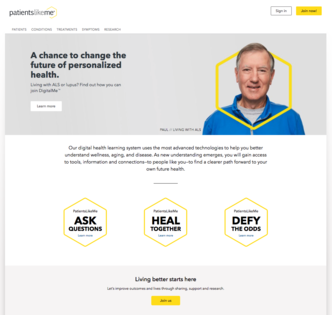Future Now
The IFTF Blog
We invented social technologies, now let’s invent social organizations
 I worry about the future of Chatroulette. This widely successful site where random strangers from around the world can chat with each other using their webcams was built by Andrey Ternovskiy, a 17-year-old Russian hacker. And what a compelling story it has been: a teenager bored with school and clearly captivated by the promise of technology, builds a site in his bedroom. A few months later the site gets more than a million hits a day. Ternovskiy has no idea what Chatroulette could be or what the "business model" behind it is. He boasts to a New York Times reporter that advertising on Chatroulette is kept to a minimum, because ads "distract you from what you want to do on the site." Ternovskiy cares to get just enough money to keep the site going. Fast forward to today: Ternovskiy is ensconced in Silicon Valley, where eager venture capitalists and seasoned entrepreneurs are advising him on "the business model." I expect the next incarnation of Chatroulette will be as a channel for social marketing. I can just imagine clicking the "next" button and seeing a ruggedly handsome 20-something proclaiming the wonders of Absolut Vodka or modeling designer jeans.
I worry about the future of Chatroulette. This widely successful site where random strangers from around the world can chat with each other using their webcams was built by Andrey Ternovskiy, a 17-year-old Russian hacker. And what a compelling story it has been: a teenager bored with school and clearly captivated by the promise of technology, builds a site in his bedroom. A few months later the site gets more than a million hits a day. Ternovskiy has no idea what Chatroulette could be or what the "business model" behind it is. He boasts to a New York Times reporter that advertising on Chatroulette is kept to a minimum, because ads "distract you from what you want to do on the site." Ternovskiy cares to get just enough money to keep the site going. Fast forward to today: Ternovskiy is ensconced in Silicon Valley, where eager venture capitalists and seasoned entrepreneurs are advising him on "the business model." I expect the next incarnation of Chatroulette will be as a channel for social marketing. I can just imagine clicking the "next" button and seeing a ruggedly handsome 20-something proclaiming the wonders of Absolut Vodka or modeling designer jeans.
After all such has been the path of many geeks who started out with the promise of creating communities and connecting people for noble purposes but quickly turned communities they enabled into markets for selling products, services, and data. This is the path of PatientsLikeMe—a site inspired by one the founder's brothers who developed Lou Gehrig's disease. The goal was to build a community for people with similar conditions to share treatment information and get knowledge and support from peers. The platform has been extremely successful, with close to 70,000 members to date sharing information on many conditions and treatment regiments. But as the community grew and the scale of operations increased, the opportunity and the promise of turning the community into a business, i.e. to monetize the community, became increasingly apparent. Today, the site sells health data, gathered from member profiles, to drug makers and others for scientific and marketing research. While such data may be beneficial to both patients and pharmaceutical companies trying to develop more effective treatments, the data is also being used to create more effective drug marketing campaigns, something that may actually be harmful to community members.
 PatientsLikeMe, Facebook, Twitter, and, I expect, shortly, Chatroulette exemplify a growing clash between the promise of commons-based platforms and the relentless drive to convert them into profit-driven businesses. The clash is likely to grow simply because the number of such endeavors is growing exponentially. What this clash brings into focus is that while we have invented a generation of transformative technologies, we remain stuck in economic and organizational models of the past.
PatientsLikeMe, Facebook, Twitter, and, I expect, shortly, Chatroulette exemplify a growing clash between the promise of commons-based platforms and the relentless drive to convert them into profit-driven businesses. The clash is likely to grow simply because the number of such endeavors is growing exponentially. What this clash brings into focus is that while we have invented a generation of transformative technologies, we remain stuck in economic and organizational models of the past.
Our technology tools and platforms are highly participatory and social. They take advantage of intrinsic human motivations to contribute in order to be noticed, to share opinions, to be a part of something greater than ourselves. Otherwise how would one explain remarkable success of Wikipedia and many other crowdsourced sites that rely on contributions of volunteers? Our business models, by contrast, are based primarily on monetary rewards. They are mostly hierarchical and non-participatory decisionmaking processes (Facebook's unilaterial decisions regarding changes in privacy terms for members is but one example). And they operate without the kind of transparency of information when applied to their own operations that is at the core of communities they enable.
If we are to truly fulfill the promise of technology tools we have created, we urgently need to design new governance models and new ways of creating value. In the least, organizations whose value derives from communities they create should incorporate the governance principles of successful commons organizations and use the same technology platforms that are at the core of their operations for governance purposes. Here are some principles I believe they need to put into practice:
- Clearly articulate the promise of the platform to the participants, with all the ensuing rights and responsibilities for members
- Create or elect a community governance board (without direct financial incentives to the project) to guide and review major policy and strategy decisions.
- Crowdsource major decisions guiding development and evolution of such platforms.
- Ensure radical transparency around key decisions and financial metrics
- Create reward structures for management and employees more akin to those of non-profits or coops rather than for-profit entities.
As community members, we, on the other hand, may need to stop thinking of such platforms as completely free and start supporting them financially in the same way we support Public Broadcasting Corporation or other non-profits whose services we use or whose missions we endorse.
We already have several organizations that operate on such principles. Wikipedia, Creative Commons, Sunlight Foundation. Several others use alternative financing mechanisms that are in line with their public and commons-like structure. BoingBoing.net accepts advertising only from organizations whose activities are not in direct violation of core beliefs and messages of its founders, either individually or collectively. Curetogether, another crowdsourced health and treatment platform, does not sell its members' data; to keep the site going, it helps pharma companies recruit subjects for clinical trials–companies can send their inclusion criteria for trials they need filled or surveys about adverse side effects, which Curetogether can then distribute to members who opt in.
No one would suggest that founders and staff working at organizations such as Twitter, Facebook, Curetogether, or many others like them should be doing it for free or should live in poverty. However, because of the unique promise of these organizations and the fact that without all of our contributions they simply would not exist, traditional profit-based business models just don't fit them.
It is not that radical of an idea to suggest that our organizational models need to change in line with the evolution of our tools. Let's not forget that organizations we inherit are not pre-ordained or immutable—they grow out of prevailing cultural norms, economic conditions, and technology infrastructure. Marshall McLuhan famously said, "We shape our tools, and thereafter our tools shape us." We invented a new generation of technologies. Now we need to allow those technologies reinvent us and our organizations.



